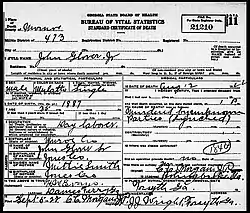Lynching of John Glover
John "Cockey" Glover[1] was a 35-year-old African-American man who was lynched in Holton in Bibb County, Georgia by a mob of 300 white men on August 2, 1922. It was the 43rd of 61 lynchings during 1922 in the United States.[2]
| Part of Jim Crow Era | |
 Death certificate for John Glover 1922 | |
| Date | August 2, 1922 |
|---|---|
| Location | Holton in Bibb County, Georgia |
| Participants | White mob of 300 |
| Deaths | John Glover |
Background
Six feet, five inches tall Deputy Sheriff Walter C. Byrd started working at the local prison but he was so brutal to its inmates that he was transferred to the Sheriff's department. There he developed a reputation for racial brutality.[3] Just after 6:00 PM on July 29, 1922, Byrd entered Hatfield's Pool Hall on Hollywood Avenue in Macon.[4] The pool hall was owned by Charles Henry Douglass, the wealthiest Black man in Macon.[5] In Hatfield a scuffle broke out and claiming self-defense Glover shot Walter C. Byrd. Another deputy there, Romas Raley, shot and killed George Marshall and mortally wounded Samuel Brooks, two Black men who happened to be playing pool.[6]
Glover escaped but the police stopped all trains and released a bulletin that read: "John (Cocky) Glover, aged 25, 5 feet 6 or 7inches in height; light mulatto; right eye cocked; wears gray striped pitch-black suit of clothes; clean shaven; neat dresser. Reward of $300 [$5,200 in 2023] will be paid by the sheriff of Bibb county for his apprehension."[6]
The day after the shooting Macon police began door-to-door warrantless searches of houses in the Black Macon neighborhoods of Pleasant Hill, Tindall Field, Unionville, and other majority Black areas.[7] In Griffin, Georgia police officers T.F. Phelps and Jim Huckabee arrested Glover on a train as he tried to flee to Chicago. Word of his arrest reached Macon and a mob of some 300 white people drove to Griffin. Police tried to secretly return Glover to Macon but they were intercepted by the mob on the road, 2 miles (3.2 km) from Holton in Bibb County, Georgia.
Glover was tied to a tree, riddled with bullets and set on fire.[8] The mob took the mutilated body and paraded it through the Black areas of Macon and tried to display it in C.H. Douglass's theatre. Police finally seized the body but did not move it from the curb outside the theatre. Thousands of Macon residents came to view the body, some fighting to grab a souvenir from the corpse.[9]
National memorial

The National Memorial for Peace and Justice opened in Montgomery, Alabama, on April 26, 2018. Featured among other things is the Memorial Corridor which displays 805 hanging steel rectangles, each representing the counties in the United States where a documented lynching took place and, for each county, the names of those lynched.[10] The memorial hopes that communities, like Macon–Bibb County where John Glover was lynched, will take these slabs and install them in their own communities.
Bibliography
- Notes
- The Pensacola Journal, August 2, 1922, p. 1.
- United States Senate Committee on the Judiciary 1926, p. 17.
- Aiello 2021, p. 99.
- Slade 2022.
- Aiello 2021, p. 101.
- Aiello 2021, p. 100.
- Aiello 2021, p. 104.
- Aiello 2021, p. 105.
- The Manning Times, August 2, 1922, p. 1.
- Robertson 2018.
- References
- Aiello, Thomas (2021). "The Three Deaths of John Glover, 1922". Georgia Historical Quarterly. Georgia Historical Society: 87–115. ISSN 0016-8297. LCCN 20007222. OCLC 173431983. Retrieved March 27, 2022.
- "Body riddled with bullets". The Manning Times. Manning, Clarendon, South Carolina: S.A. Nettles. August 2, 1922. pp. 1–8. ISSN 2330-8826. OCLC 13611767. Retrieved March 27, 2022.
- "Closing Negro shops prevents Macon race riot". The Pensacola Journal. Pensacola, Escambia, Florida: Mayes & Co. August 2, 1922. pp. 1–8. ISSN 1941-109X. OCLC 16280864. Retrieved March 25, 2022.
- Robertson, Campbell (April 25, 2018). "A Lynching Memorial Is Opening. The Country Has Never Seen Anything Like It". The New York Times. Retrieved January 29, 2022.
- Slade, Paul (2022). "White riot: a Georgia lynching". Planetslade.com. Retrieved March 27, 2022.
- United States Senate Committee on the Judiciary (1926). "To Prevent and Punish the Crime of Lynching: Hearings Before the United States Senate Committee on the Judiciary, Subcommittee on S. 121, Sixty-Ninth Congress, First Session, on Feb. 16, 1926". United States Government Publishing Office. Retrieved January 23, 2022.